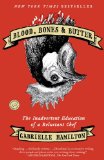Summary | Excerpt | Reviews | Beyond the Book | Readalikes | Genres & Themes | Author Bio

The Inadvertent Education of a Reluctant Chef
by Gabrielle Hamilton
But the lamb roast was not a heavily themed and elaborately
staged one-off. It was, as parties in our family went, a simple party,
thrown every year, produced with just a fire and a sheet of plywood
set over sawhorses for the carving of the lambs. We built a fire in our
shallow pit, about eight feet long and six feet wide. It's possible that
my dad dug it alone, but if there was an available sixteen-year-old
around, like his son, my oldest brother Jeffrey, it's very likely that they
dug it together. At each end of the pit they set up a short wall of cinder
blocks with a heavy wooden plank on top, looking like the head
and baseboards of a giant bed, where the long wooden poles onto
which the baby lambs had been lashed would rest. The baby lambs,
with their little crooked sets of teeth and milky eyes, were slaughtered
and dressed up at Maresca's Butchers, then tied onto ten-foot poles
made of ash because the branches of an ash tree grow so straight that
you can skewer a baby lamb with them easily.
Jeffrey had a driver's license and a 1957 Chevy truck with a
wooden bed and a big blue mushroom painted on its heavily Bondoed
cab. It had big dangling side-view mirrors and torn upholstery
over which we threw a mover's blanket, but it ran. So on this bluish
early summer weekend, Jeffrey drove his new jalopy out the winding
country roads, past Black's Christmas tree farm, and past the Larue
bottle works. I rode in the bed of the truck, in a cotton dress and boy's
shoes with no socks, hanging on as tight as I could to the railings and
letting the wind blast my face so hard that I could barely keep my eyes
open. Even with my eyes closed, I could tell by the wind and the little
patches of bracing coolness and the sudden bright sunshine and
the smell of manure when we were passing a hay field, a long thick
stand of trees, a stretch of clover, or a horse farm. We passed brandnew
deer emerging from the woods and standing in herds of forty in
the wide open cornfields. Finally we got to Johnson's Apple Orchard
where we picked up our wood for the fire.
The orchard and the Christmas tree farm are long gone, the
butcher shop and the dairy farm are still, oddly, in business, hanging
on like grave markers in a sunken and overgrown cemetery -
historical "by-the-ways" for the tourists on their way to Bowman's
Tower and Washington's Crossing. Where there were four separate
places for four separate things, now everybody just goes to the Shopping
Plaza to get all of them in one big harshly lit store - milk, apples,
meat, even the Christmas tree - while the kids wait in the car and eat
fries in the backseat.
At Johnson's orchard, in season, they sold yellow peaches and half
a dozen kinds of apples in wooden bushel baskets. But at the time of
the lamb roast it was still too early in the year to buy fruit. They had
pruned all the trees back for the season, and we filled the truck with
the trimmings, piling the apple-wood branches high above the truck
bed, which we'd extended with two eight-foot sheets of plywood. This
green wood would burn longer and hotter, hissing all night long as the
sap dripped down into the flames. On the way back home, I sat up in
the cab of the truck between my brother who was driving and my dad
who had the window rolled all the way down and his elbow hanging
out. He said, "That'll burn with the fragrance of its fruit, you see."
The paraphernalia of butchery may be repulsive to some. But to
me, hacksaws, cleavers, and band saws all looked manageable and appealing.
I loved going to Maresca's, the Italian butcher shop up the road
on the Jersey side, and always asked to be taken along on errands if
Maresca's was on the list. There was no "artisanal" at this point, no "organic"
or "diver-picked" or " free-range" or "heirloom" anything. In
1976, there was no such thing, even, as 2 percent milk. We just had milk.
And the Marescas were still just butchers, father and sons butchers -
Salvatore, Joe, and Emil - working in a shop with sawdust on the floor.
The father Salvatore and his son Joe looked exactly like butchers - with
girth, flannel shirts under their long jackets and aprons, and greasy, beefy
catcher's-mitt hands. Emil, on the other hand, looked like he could have
been a chemist in a lab or a home ec teacher - in an apron, always, but
with a V-neck sweater vest over his flannel shirt and a pair of nice brown
corduroys. He wanted to be a baseball player, I had heard, but ended up
in the family business. Emil spent most of his day in the old kitchen
open and adjacent to the butcher shop, skewering and marinating
cubed meats and making all the shop's sausages and cooking the daily
lunch for the family.
Excerpted from Blood, Bones & Butter by Gabrielle Hamilton. Copyright © 2011 by Gabrielle Hamilton. Excerpted by permission of Random House. All rights reserved. No part of this excerpt may be reproduced or reprinted without permission in writing from the publisher.
Your guide toexceptional books
BookBrowse seeks out and recommends the best in contemporary fiction and nonfiction—books that not only engage and entertain but also deepen our understanding of ourselves and the world around us.